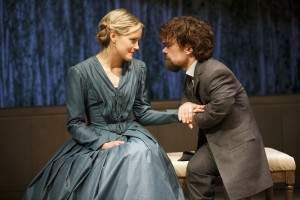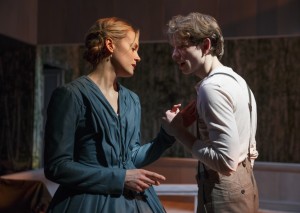Thanks to Taylor Schilling, Emmy nominee for Orange Is the New Black, and Peter Dinklage, Emmy and Golden Globe winner for Game of Thrones, all performances of Turgenev’s A Month in the Country at Classic Stage Company (CSC) are sold out. The production, utilizing a new translation by American actor John Christopher Jones, is the first New York revival of Turgenev’s great play in 20 years. It’s overseen by the distinguished mid-career director Erica Schmidt, who previously directed Schilling and Dinklage in Chekhov’s Uncle Vanya outside New York City and who happens to be married to Dinklage. Schmidt and her 13-member ensemble are discovering enormous humor, both subtle and ribald, in Turgenev’s complicated text, as well as the expected poignance.
Ivan Sergeyevich Turgenev (1818–1883) was a contemporary of Leo Tolstoy and Fyodor Dostoevsky. Unlike Tolstoy and Dostoevky, he was educated in western Europe and lived much of his adult life in France. His writing, though equally concerned with Russian characters in Russian settings, is markedly different in perspective and tone from that of his Russian peers and lacks their preoccupation with religion and the spiritual life.
A Month in the Country depicts the effect of an outsider — a callow but appealing student from Moscow — on a clique of leisured aristocrats. The play, which Turgenev originally called The Student, was written in the 1850s but ran afoul of the Russian censors and wasn’t performed until 1872. In many ways, it presages the subjects and serio-comedic tone of Chekhov’s major plays. Dramatist Brian Friel, who created an adaptation of A Month in the Country for the Gate Theatre in Dublin, suggests that, in this drama, Turgenev wrote “Chekhovian characters and situations forty-six years before Chekhov wrote his first fully Chekhovian play, The Seagull.”
Natalya Petrovna Islayev (Schilling), married to a man several years her senior, has been conducting a chaste romance with a neighbor, Rakitin (Dinklage). Deeply concerned about maintaining a reputation for virtue, Natalya has managed to hide her wayward emotions from husband Arkady (Anthony Edwards), his vigilant mother (Elizabeth Franz), their gossipy physician (Thomas Jay Ryan), and other hangers-on (Peter Appel, Frank Van Putten and Annabella Sciorra). When Belyaev (Mike Faist) arrives as summertime tutor for Natalya’s son Kolya (Ian Etheridge), Vera (Megan West), Natalya’s 17-year-old ward, falls hard for him, as do Natalya herself and a servant, Katya (Elizabeth Ramos). The sexual tension that results could fuel a French farce; but Turgenev, who didn’t go in for farce, depicts instead how (as phrased by Rakitin in the classic translation by Constance Garnett): “[L]ove of every kind … is a real calamity if you give yourself up to it completely.”
Schmidt, scenic designer Mark Wendland, and lighting designer Jeff Croiter work skillfully together to give Turgenev's five acts, retooled in American vernacular by Jones, a momentum that seems quite contemporary. Schmidt and her actors have added some between-scenes action (played — or almost danced — in soft light) that serves to comment on the narrative and what the playwright has left unspecified. The between-scenes activities do not appear in the typescript of Jones’s new version of the play, so it’s a fair assumption that they're liberties — defensible liberties — of an innovative director who's in sync with her modern audience.
Audience members attracted by the television stars may be astonished at how fresh and contemporary this 165-year-old comedy-drama feels. Schilling and Dinklage in particular handle their soliloquies, the most antiquated aspect of the text, with a light but never dismissive style that gives those speeches verisimilitude comparable to the “couch interludes” in an episode of Modern Family. But what's crucial is the power of Turgenev’s play, no matter the translation, to transcend its mid-19th century context, bridging the chasm between European Romanticism and modernity.
A Month in the Country by Ivan Turgenev presented by Classic Stage Company (136 East 13th Street between Third and Fourth Avenues), runs Tuesdays through Thursdays at 7 p.m., Saturdays at 3 p.m. and 8 p.m., and Sundays at 3 p.m. through Sunday, February 22. Tickets start at $75. Running time is two hours, including one intermission. Tickets may be purchased by visiting www.classicstage.org or calling 212-352-3101, 866-811-4111 or at the box office.



